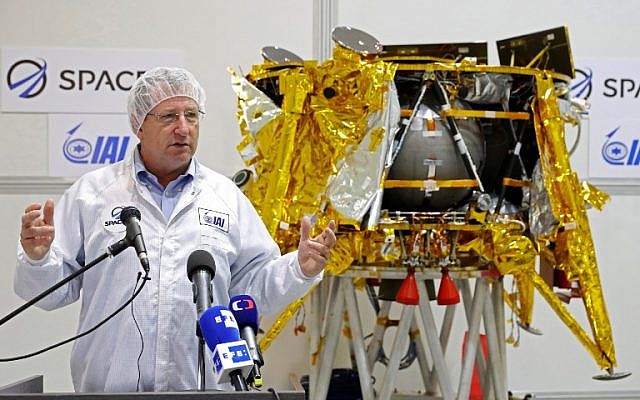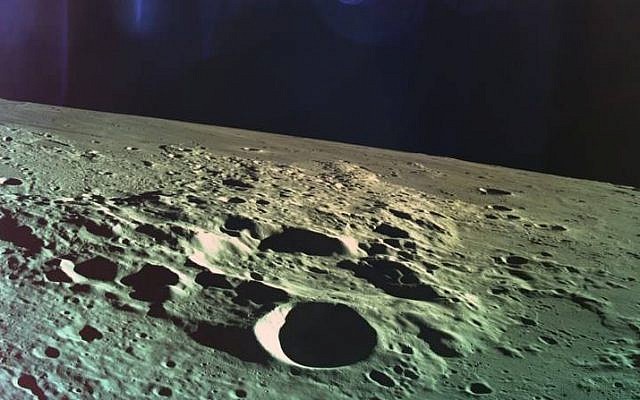Following the Israeli spacecraft Beresheet’s failure to land safely on the moon this week, SpaceIL chairman Morris Kahn on Saturday announced he was launching project Beresheet 2, effective immediately, adding: “We started something and we need to finish it. We’ll put our flag on the moon.”
The small spacecraft, the world’s first privately funded moon lander, crashed into the lunar surface Thursday night during an attempted landing, apparently due to a technical glitch that caused its main engine to stop mid-landing.
Appearing on Channel 12’s “Meet the Press,” South African-born billionaire Kahn said work on the successor to Beresheet would start Sunday.
“The response we’ve gotten has been amazing. The amount of thank yous and letters is amazing,” he said. “Over the weekend I’ve had time to think about what happened, and the truth is seeing all the encouragement and support from people all over the world is amazing.
“It gave me time to think and I thought it would be a shame to leave things like that. I’ve come to announce a new project: Beresheet 2. We started something and we need to finish it. We’ll put our flag on the moon.”
He added that “Project Beresheet 2 begins tomorrow… A mission team will be meeting tomorrow to start work.”

Morris Kahn speaks on Channel 12, April 13, 2019 (screenshot)
Following his announcement, Israel Aerospace Industries, which partnered on Beresheet, said it would gladly take part in future SpaceIL ventures.
Kahn provided a large chunk of the $100 million (NIS 370 million) required to build and launch the spacecraft — a novel approach that came at a fraction of the cost of previous, state-funded efforts to land on the moon.
The project was a joint venture between the Israeli nonprofit SpaceIL and Israel Aerospace Industries, funded almost entirely by private donations from well-known Jewish philanthropists, including Kahn, Miriam and Sheldon Adelson, Lynn Schusterman, and others.

In this file photo taken on December 17, 2018, Israel Aerospace Industries space division director Opher Doron stands in front of the Beresheet spacecraft during a presentation by Israeli nonprofit SpaceIL and Israeli state-owned IAI, in Yehud, east of Tel Aviv. (Jack Guez/AFP)
SpaceIL’s founders said a major goal of the project was space education and encouraging children to enter science fields.
“I’m ready to work for this and do whatever is takes for this project to move forward,” Kahn said. “This is also a good lesson for the youth. I said that if you fail you need to get up and try again and this is an example I have to give them.”
For Beresheet 2, Kahn said the hope was to enlist the public to shoulder some of the costs, possibly through a crowdfunding campaign.

One of the last photos taken by Beresheet before crash landing into the moon on April 11, 2019. (Courtesy SpaceIL)
“We’ll get the funds from donors and the public,” he said. “Everybody wants to take part. I got an offer from someone rich in the US who offered to pay a lot of money but I think the funds should come from the public. This should be a people’s project.”
Following the Beresheet crash, Prime Minister Benjamin Netanyahu appeared to indicate that the government would support a follow-up endeavor. Unidentified government sources told Channel 12 on Saturday the government would back the project, though it was not clear to what extent.
“We’re not counting on support from the government,” Kahn said. “If they help, good, but we’re counting on the public.”

Prime Minister Benjamin Netanyahu with engineers and SpaceIL founders in the Yehud control room vowed to try again for the moon after the Beresheet spacecraft crashed on April 11, 2019. (courtesy)
Ehud Hayun, a space systems engineer at IAI, said: “I’m not crushed, I’m disappointed, but I’m very proud of what we achieved. We had a lot of success along the way, until the hard landing. We knew it was a risky mission, and the risk we were taking to build it cheap and fast. But we tried.”
SpaceIL co-founder Yariv Bash said it would take about two or three years to get another prototype ready for a moon landing.
Opher Doron, the general manager of the Israel Aerospace Industries’ space division, which collaborated on building the spacecraft, said engineers were still studying the problem that led to the crash. Currently, they believe there had been a failure with one of the telemetry (altitude) measurement units, which caused a chain of events that ended up cutting the main engine about 10 kilometers (6 miles) above the moon’s surface. Without the main engine, the spacecraft could not properly brake in time to make a gentle landing, instead crashing into the moon Thursday.
SpaceIL co-founder Yonatan Winetraub said in a press conference after the crash: “We didn’t reach the moon in one piece. That sucks. However, engineering and science are hard. Sometimes it doesn’t work the first time, sometimes it doesn’t work the second or third time. But it will work.”
Former astronaut and second man on the moon Buzz Aldrin on Thursday tweeted his condolences to the team, saying the project was “inspiring.”
“Never lose hope – your hard work, team work, and innovation is inspiring to all!” he wrote.
Melanie Lidman contributed to this report.
https://www.timesofisrael.com/spaceil-chief-beresheet-2-starts-tomorrow-well-put-our-flag-on-the-moon/
2019-04-13 19:30:00Z
52780267586188
Tidak ada komentar:
Posting Komentar